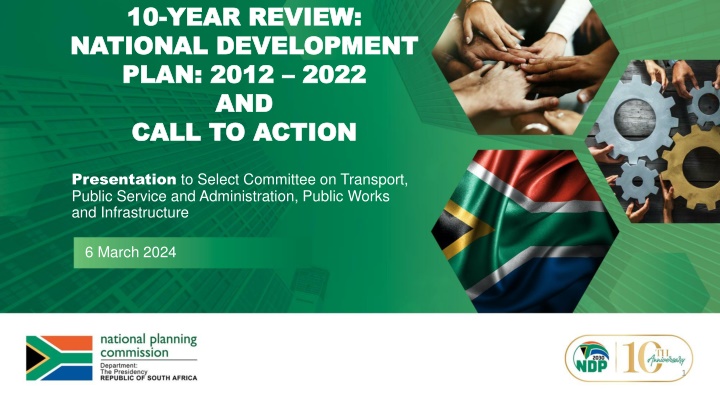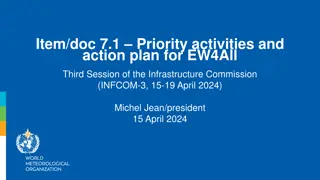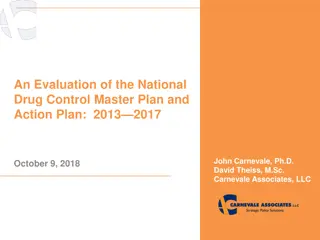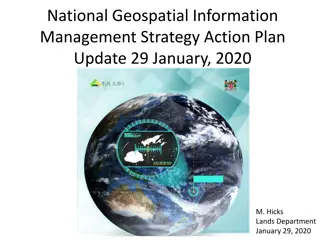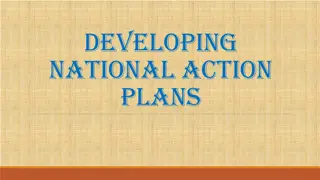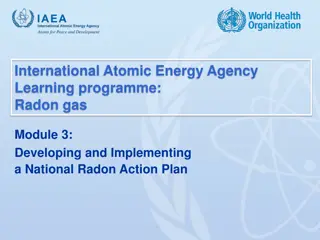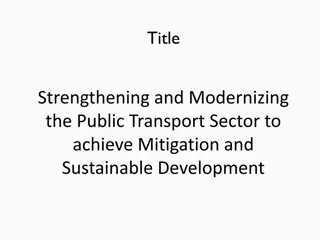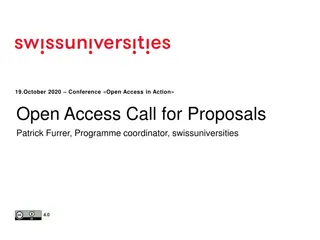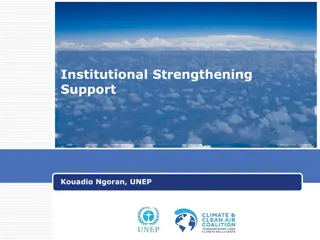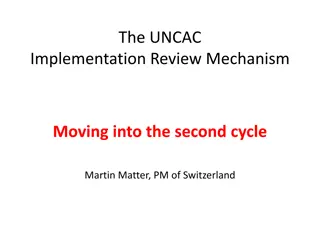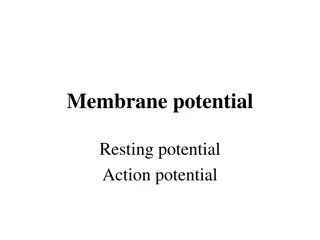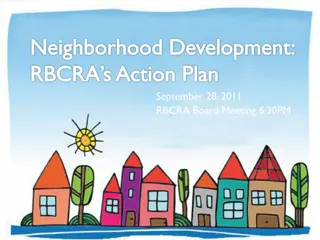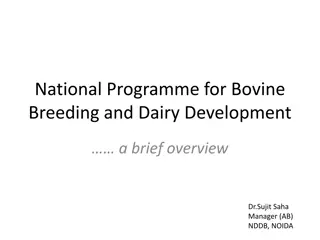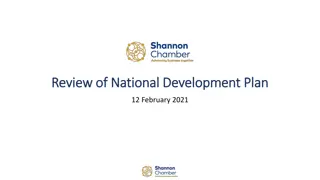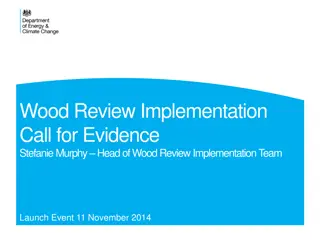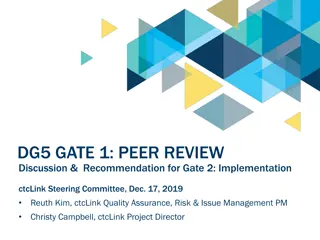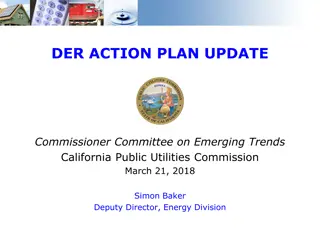National Development Plan 10-Year Review and Call to Action Presentation
The presentation to the Select Committee on Transport, Public Service, and Administration reviews the National Development Plan (2012-2022) outcomes, findings, and proposals. It highlights the establishment and evolution of the National Planning Commission, outlines the 2030 NDP targets, and discusses the challenges and achievements in areas such as social protection, healthcare, economy, education, and spatial inequality. The review identifies the need for significant improvements in achieving the plan's objectives regarding poverty, inequality, unemployment, service delivery, and economic growth.
Download Presentation

Please find below an Image/Link to download the presentation.
The content on the website is provided AS IS for your information and personal use only. It may not be sold, licensed, or shared on other websites without obtaining consent from the author.If you encounter any issues during the download, it is possible that the publisher has removed the file from their server.
You are allowed to download the files provided on this website for personal or commercial use, subject to the condition that they are used lawfully. All files are the property of their respective owners.
The content on the website is provided AS IS for your information and personal use only. It may not be sold, licensed, or shared on other websites without obtaining consent from the author.
E N D
Presentation Transcript
10 10- -YEAR REVIEW: YEAR REVIEW: NATIONAL DEVELOPMENT NATIONAL DEVELOPMENT PLAN: 2012 PLAN: 2012 2022 AND AND CALL TO ACTION CALL TO ACTION 2022 Presentation to Select Committee on Transport, Public Service and Administration, Public Works and Infrastructure 6 March 2024 1
PRESENTATION OUTLINE 01 NPC BACKGROUND & NPC HIGHLIGHTS 02 NPC 2021 - 2026 MANDATE 03 2030 NDP TARGETS AND OUTCOMES 04 2020 NDP REVIEW FINDINGS 05 RATIONAL FOR NDP 10-YEAR REVIEW 06 NDP 10-YEAR REVIEW FINDINGS ( ECONOMY, SOCIAL & GOVERNANCE) 07 CONTRIBUTING FACTORS (ECONOMY, SOCIAL & GOVERNANCE) 08 CROSS CUTTING FINDINGS 2 09 NPC PROPOSALS ON NDP 10-YEAR REVIEW
NPC BACKGROUND Establishment through the revised Green Paper: National Planning Commission of 2010 2015 2021 2021 Second NPC was formed with Third Commission a mandate to provide guidance (current) was 3rdNPC 2ndNPC and support for the appointed. measurement and 2015 2026 implementation of the NDP. 2010 4thNPC 1stNPC First Commission was established with a mandate 2010 2030 to create NDP. An independent expert advisory body and think-tank with a mandate to take long-term, cross-cutting research and an independent approach to the country's development agenda.
NPC HIGHLIGHTS NPC I NPC II NPC III
2030 NDP TARGETS Social protection Quality healthcare for all An economy that will create more jobs Improving the quality of education, training and innovation Transition to a low-carbon economy Reversing the spatial effects of apartheid An inclusive and integrated rural economy Reforming the public service Building safer communities 6
2020 NDP REVIEW FINDINGS In general, the outcomes and quality of the NDP objectives required significant improvement. Poverty was on an upward trend, and inequality was persistent Unemployment had been on the rise Service delivery had worsened, and coupled with the economy s labour market difficulties, negatively affected the delivery of the social wage to the poorest households 2020 NDP Review Spatial inequality challenges persist However, in the area of social protection, notable progress was achieved, especially in terms of health and access to social assistance Economic growth had been stagnant and was in recession terrain 7
RATIONALE FOR NDP 10-YEAR REVIEW The review assesses the progress made with the key NDP targets of eliminating poverty and reducing inequality and unemployment. The review interrogates the factors that affected the implementation of the NDP since its adoption, including consideration of domestic and international crises. The review was required to determine progress made and identify course correction measures based on the changed circumstances over the last 10 years. Evaluates the extent to which planning has been institutionalised and the reform of the country s planning system across all spheres The review focuses on the 2018-2022 period, which covers the period since the previous 2018 NDP Review, which was published in 2020. It builds on the reviews of MTSF in DPME 8
NDP 10-YEAR REVIEW FINDINGS Economy, Social and Governance issues 9
NDP TARGETS AND OUTCOMES NDP target Baseline Target 2018 2021 2022 2012 Actual Actual Actual 2030 3.3% (2011) 0.8% 0.9% GDP growth (average) 5.4% 1.1% 0.69 (2009) 0.69 0.69 Reduce income inequality (Gini income measure) 0.60 36.4% (2011) 21.7% Eliminate poverty below LBPL 0% 19.3% (2010) 18.2% 13.1% Investment (gross fixed capital formation) as a percentage of GDP 30% 14.1% 6.8% 5.7% 4.1% Public sector (state- and state-owned entities) investment as a percentage of GDP 10% 55.4% 59.3 58.6% Labour force participation rate 56.6% 59.4% 25.4% 27.7% 33.9% Reduce unemployment (%) 6% 32.9% 13.65 million 16.2 million 15.6 million Employment (million) 24 million 16.1 million 41.3% 43.3% 38.7% Employment ratio (employment/working age population) 61% 39.9%
ECONOMY FINDINGS Private Economy remains in a low-growth trap. Growth has averaged 1.1 % for the period with per capita GDP growth negative Income poverty has been rising since 2015. 19.4 million in poverty in 2020. Poverty differs substantially by Spatial inequality challenges persist investment has declined GCFC as % GDP averaged 19.6% between 2012-2019. Investment as a percentage of GDP averaging high levels of concentration and barriers to entry of new firms and SMMEs race. 14.1% 2022 2030 2012 SA remains the most unequal country in the world with incomes that are highly polarised. Wealth inequality is much larger than consumption expenditure inequality. Unemployment has increased to 32.9% - 8.0 million unemployed and about 3.6 million discouraged Lack of energy security and, in particular, a reliable electricity supply, which is widely recognised as a major obstacle to growth, has become an increasing concern 8 years remaining 10 years of National Development Plan (NDP)
ECONOMY CONTRIBUTING FACTORS Slow investment growth can largely be attributed to declining investment by private businesses due to deteriorating economic outlook, policy uncertainty, and slowdown in general government and SOE investment Lack of employment creation, transformation, innovation, and competitiveness Measures to address climate Global response to contain the Covid-19 pandemic change Economy Low GCFC largely due to a decline in private investment, a slowdown in general government spending, and reduced capital spending from impact of lockdown saw informal enterprises decrease by 25% SOEs SMME development challenges lack of finance, access to markets, provision of basic infrastructure (water, sanitation and electricity), and regulatory and administrative inefficiencies (red tape). The rise of criminal syndicates, in particular, in the mining and construction sector hampering growth prospects Energy crisis. 12
SOCIAL FINDINGS While there has been progress in several areas in the social sector, it has been too slow and with regression in some cases Implementation of NHI, may have unintended outcomes - governance issues, status of medical aid schemes, and potential for corruption Number of grant beneficiaries has grown. CSG falls well below the food poverty line Progress on life expectancy and infant mortality. Further action required to meet NDP health-related Dual health system is characterised by inequities in quality, efficiency, and effectiveness. goals 2022 2030 2012 NIECD adopted by Cabinet in Schooling has improved. Bachelor passes surpassed NDP Stunting prevalence has remained unchanged in relation to set 2015 target target 8 years remaining 10 years of National Development Plan (NDP)
SOCIAL CONTRIBUTING FACTORS The effect of the Covid-19 pandemic High level of poverty Inability to prioritise Contributing factor of vitamin A deficiency under age of five years is lack of exclusive breastfeeding during the first six months Social Poor sequencing of programme interventions High unemployment rate results in social grants supporting households. Child Support Grant and National School Nutrition Programme contributed to decline in child hunger rates 14
GOVERNANCE FINDINGS National Framework Progress made on key pieces of public service legislation to strengthen state capacity Spatial policy reform inadequate - majority located far from employment opportunities, inadequate approach to human settlements Transforming society and uniting the country remain a challenge. Government s initiatives are piecemeal, under-resourced, and without demonstrable Towards Professionalisation of Public Sector approved by Cabinet in October 2022 impact. Trust in nearly all institutions is low and declining 2022 2030 2012 Designation of DG in Presidency as Head of Public Administration and DG in Premiers offices, and extension of tenures are additional positive measures. Planning framework still to be promulgated Unevenness in state capacity remains a challenge: NDP was based on capable state Despite government measures, crime remains a problem 10 years of National Development Plan (NDP) 8 years remaining
GOVERNANCE CONTRIBUTING FACTORS Lack of capacity within the state to execute plans, state capture and corruption as well as international and local shocks Poor productivity, corruption, wastage, sabotage, and leakage, coupled with a lack of accountability have all undermined efforts to build state capacity and service delivery Persistent social inequality and lack of leadership affecting social cohesion. GOVERNANCE Lack of trust in the police and inaccessibility of police stations. Pervasive corruption within police services. Lack of legislation that would properly institutionalise the emergent planning system Lack of adequate alignment between planning and budgeting cycles and processes, incoherence in spatial planning system, misalignment of planning cycles. 16
CROSS CUTTING FINDINGS Pandemic s social impact on South Africa has been high impacting on poverty, inequality, and unemployment. Approximately 2.2 million South Covid-19 pandemic forced government to make difficult policy choices to restore macroeconomic stability, deal with health and socioeconomic crises, accelerate growth, and make economy more inclusive Africans lost their jobs. Slow implementation of programmes focusing on Persons with Disabilities Gender crimes remain an issue Cross Cutting Issues Youth continue to face disadvantages in labour market. Unemployment higher than the national average. Very few state institutions have factored youth development into their planning. Implementing NDP requires a gender focus if social and economic objectives of reducing poverty and inequality are to be met 17
NPC PROPOSALS ON NDP 10 YEAR REVIEW Maintaining current fiscal and monetary policies until expansion is possible 1 Establish strong public/private partnerships and strengthen trust to meet public sector goals and build inclusive economy Reducing red tape and increasing financing for small businesses 2 6 Taking decisive action against economic crimes like theft, infrastructure vandalism, construction sector extortion, and illegal mining 3 5 Addressing logistics issues and licensing bottlenecks to unlock mining industry's potential. 4 Addressing financing challenges, land reform, logistical constraints, and irrigation rights to unlock the agriculture sector's potential 18
NPC PROPOSALS ON NDP 10 YEAR REVIEW CONT Before enacting the NHI Bill, the government should consider its governance limitations 7 Implement the framework on professionalisation of public service. Provide comprehensive ECD services (incl. health) 8 12 Ensure that appointments to the public sector and SOE boards are based solely on merit, rather than political considerations. Improving SOE reforms for Eskom, Transnet, and SANRAL 9 11 Finalise the Integrated Planning Framework Bill to guide developmental planning and the corresponding institutional structure. 10 Institutionalizing planning across all levels of government and ensuring public participation is crucial. 19
Call to Action The NDP remains as relevant as ever To reach NDP goals, economic, social, and environmental fundamentals must be in place. A comprehensive, coordinated, multi-sectoral partnership approach to development must be adopted An approach rooted in good governance, economic transformation, social cohesion, a just transition to more sustainable development pathways as well as a bias in favour of the poorest of the poor. We therefore call on all South Africans to play their part in the restoration of hope and in a more vigorous pursuit of the goals of the NDP over the second decade of the NDP up to 2030. We call on the We call on Cabinet and We call on Parliament We call on Local We call on the President to use his all government to refocus on the NDP Governments to focus Business sector to high office to advocate departments to create a when holding entities to on the core make its own for the return of the policy environment that account. responsibilities of contribution to the NDP to the centre of all prioritises the needs of providing services attainment of the NDP government planning. the poorest of the poor. goals. It is our future, let us make it work
THANK YOU 21
